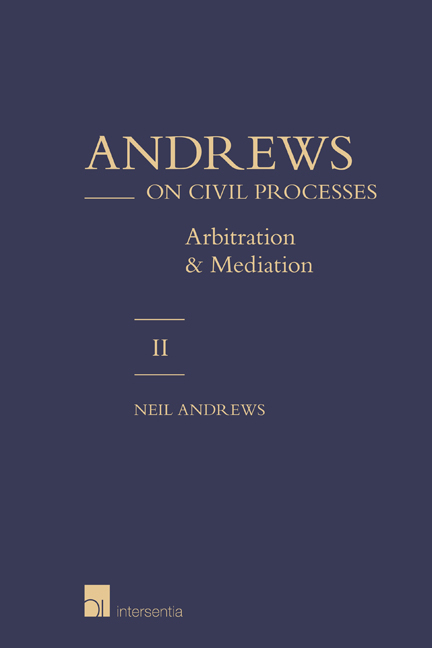Book contents
- Frontmatter
- Dedication
- CONTENTS VOLUME I
- Contents
- Table of Cases
- Table of Statutes
- Table of Statutory Instruments
- PART I MEDIATION
- PART II ARBITRATION
- Chapter 3 Commercial Arbitration: What Is It and Why Choose It?
- Chapter 4 The Major Principles of Arbitration and Litigation: A Comparison
- Chapter 5 Fundamental Features of English Arbitration
- Chapter 6 ‘The Seat’ and the Range of Relevant Laws
- Chapter 7 ‘Arbitrability’: Public Policy Limitations upon the Scope of Arbitration
- Chapter 8 A Confidential Process
- Chapter 9 Arbitration Agreements
- Chapter 10 Courts Giving Effect to Arbitration Agreements
- Chapter 11 Commencement of the Submission and Time Issues
- Chapter 12 The Tribunal's Appointment, Tenure and Immunity
- Chapter 13 Pre-Hearing Proceedings
- Chapter 14 The Hearing
- Chapter 15 Final Remedies, the Award, and Correction of the Award by the Tribunal
- Chapter 16 Fees, Expenses and Recoverable Costs
- Chapter 17 Arbitration Awards: Issues of Finality and Res Judicata
- Chapter 18 Challenges to English Arbitral Awards under English Law
- Chapter 19 English Enforcement of English Awards
- Chapter 20 Enforcement under the New York Convention (1958)
- PART III CONSUMER ADR
- Select Bibliography
- Index to Volumes I and II
Chapter 7 - ‘Arbitrability’: Public Policy Limitations upon the Scope of Arbitration
from PART II - ARBITRATION
Published online by Cambridge University Press: 13 December 2017
- Frontmatter
- Dedication
- CONTENTS VOLUME I
- Contents
- Table of Cases
- Table of Statutes
- Table of Statutory Instruments
- PART I MEDIATION
- PART II ARBITRATION
- Chapter 3 Commercial Arbitration: What Is It and Why Choose It?
- Chapter 4 The Major Principles of Arbitration and Litigation: A Comparison
- Chapter 5 Fundamental Features of English Arbitration
- Chapter 6 ‘The Seat’ and the Range of Relevant Laws
- Chapter 7 ‘Arbitrability’: Public Policy Limitations upon the Scope of Arbitration
- Chapter 8 A Confidential Process
- Chapter 9 Arbitration Agreements
- Chapter 10 Courts Giving Effect to Arbitration Agreements
- Chapter 11 Commencement of the Submission and Time Issues
- Chapter 12 The Tribunal's Appointment, Tenure and Immunity
- Chapter 13 Pre-Hearing Proceedings
- Chapter 14 The Hearing
- Chapter 15 Final Remedies, the Award, and Correction of the Award by the Tribunal
- Chapter 16 Fees, Expenses and Recoverable Costs
- Chapter 17 Arbitration Awards: Issues of Finality and Res Judicata
- Chapter 18 Challenges to English Arbitral Awards under English Law
- Chapter 19 English Enforcement of English Awards
- Chapter 20 Enforcement under the New York Convention (1958)
- PART III CONSUMER ADR
- Select Bibliography
- Index to Volumes I and II
Summary
INTRODUCTION
Not all civil disputes or issues are capable of being subject to arbitration. Section 81(1)(a) of the Arbitration Act 1996 (England and Wales) refers to ‘matters which are not capable of settlement by arbitration’. Section 81(1)(c) of the Arbitration Act 1996 (England and Wales) refers to ‘the refusal or recognition or enforcement of an arbitral award on grounds of public policy’.
It is clear, for example, that it would not be possible to use arbitration to determine matters affecting the welfare of children. But an open mind might be taken to questions of matrimonial finance not affecting children. In this context there is in fact a demand for arbitration in England, because this consensual process would be very likely to be both quicker and cheaper than the court process regulating divorce and financial orders. Furthermore, arbitration would be confidential. The legal impediment is that family court's jurisdiction cannot be ousted. And so an arbitration award would need to be clothed as a consent order, requiring the court to ratify. This issue remains to be worked through.
Another context in which arbitration would be problematic, and probably unavailable, is planning law. Such issues, although arising between individual landowners and planning authorities, are not merely bilateral contests: they have an obvious impact on third parties, and affected persons, sometimes the public at large, are given wide scope to participate or intervene and make objections.
Many of these matters can be expressed as a matter of public policy. But there are also issues which lie beyond the competence of arbitrators because they lack the remedial powers to make determinations which will affect third parties. On this basis it is clear that winding-up petitions (in the sphere of company law) cannot be the subject of arbitration. Only the court has power to make such complex determinations.
Mustill & Boyd (2001), whilst acknowledging the principled and legislative fact that there are certain matters not susceptible to arbitration, suggested attractively that:
‘[T]he policy of English law, as of arbitration law worldwide, is to encourage and support arbitration as a means of settling commercial disputes, and particular international commercial disputes. Doctrinaire disapproval of procedures on the margin of arbitrability is not the way forward. If the parties have chosen any method which they intend to be a form of arbitration they should be allowed, and if possible compelled, to affirm their choice.’
- Type
- Chapter
- Information
- Andrews on Civil ProcessesArbitration and Mediation, pp. 169 - 178Publisher: IntersentiaPrint publication year: 2013
- 1
- Cited by



